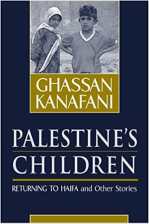Three Books: Translated and Introduced by Barbara Harlow (1948-2017)
Yesterday, Jadaliyya published a special section on scholar-activist Barbara Harlow, who died this January:
Introduced by Anthony Alessandrini, the tribute to a major scholar of postcolonial literature looks at ways in which Harlow influenced both lives and scholarship. Harlow taught at the University of Texas for more than thirty years and, although she co-translated just one full-length book from the Arabic, Ghassan Kanafani’s Palestine’s Children: Returning to Haifa and Other Stories, her hands touched many others, both during her time at the American University in Cairo and afterwards.
 1) Palestine’s Children, by Ghassan Kanafani, trans. Harlow and Karen E. Riley
1) Palestine’s Children, by Ghassan Kanafani, trans. Harlow and Karen E. Riley
The book includes a critical introduction to Kanafani’s work and:
The slope — Paper from Ramleh — A present for the holiday — The child borrows his uncle’s gun and goes east to Safad — Doctor Qassim talks to Eva about Mansur who has arrived in Safad — Abu al-Hassan ambushes an English car — The child, his father, and the gun go to the citadel in Jaddin — The child goes to camp — The child discovers that the key looks like an axe — Suliman’s friend learns many things in one night — Hamid stops listening to the uncles’ stories — Guns in the camp — He was a child that day — Six eagles and a child — Returning to Haifa.
2) A Balcony over the Fakihani, by Liyana Badr, trans. Peter Clark and Christopher Tingley, introduced by Harlow.
This collection of linked novellas includes “A Land of Rock and Thyme,” “A Balcony Over the Fakihani,” and “The Canary and the Sea.”
 3) Year of the Elephant: A Moroccan Woman’s Journey Toward Independence, by Leila Abouzeid, trans. Barbara Parmenter, introduction by Harlow.
3) Year of the Elephant: A Moroccan Woman’s Journey Toward Independence, by Leila Abouzeid, trans. Barbara Parmenter, introduction by Harlow.
This collection includes both Year of the Elephant and eight short stories. But in her introduction to the revised edition, Harlow places the novella about Zahra’s “journey toward independence,” Year of the Elephant, at its center.
“If the English translation of Year of the Elephant was an ‘event in cross-cultural literary history’ in 1989, its re-edition twenty years later, and following the exposuers of the ‘years of lead,’ dramatically recontextualizes the short novel within another concatenation of events and their reprisals in the official reports and personal narratives elicited through truth commissions and human rights testimonies, public affidavits, and personal memoirs–all of which resonate with other such testimony from the recent genealogy of truth commissions and international tribunals, from Argentina to South Africa, from Cambodia to Rwanda, and the former Yugoslavia. A reader can only wonder at this point what Zahra’s husband’s role might have been in the Instance d’Equite et Reconciliation hearings. Or what might yet be the implications for Zahra herself, for that matter?
And from the special section on Jadaliyya:
Ferial Ghazoul, “Barbara Harlow: The Formative Egyptian Period”
Jennifer Wenzel, “Generations of Resistance”
Rania Jawad, “Barbara Harlow and the Necessity of ‘Renewed Histories of the Future’”
Joseph Slaughter, “The Occupation of Literature and Books That Are Difficult to Get”

May 13, 2017 @ 1:06 pm
Reblogged this on World4Justice : NOW! Lobby Forum..